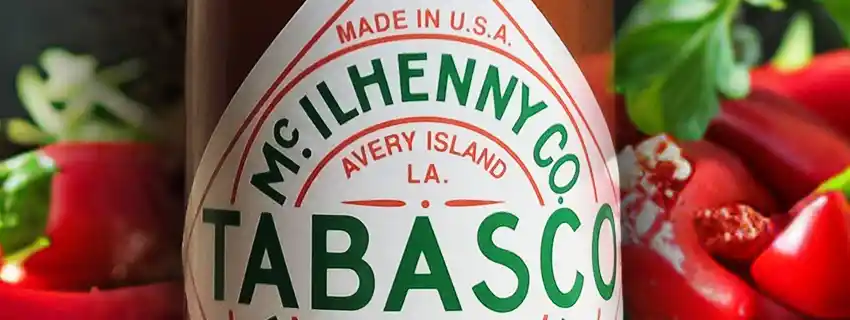Published:
Author: Antonio Maria Guerra
How is Tabasco made?
I
f there is a food product that, more than many others, is generally associated with the idea itself of extreme spiciness, it’s Tabasco. In truth, this ‘bad’ reputation is mostly undeserved, since what really characterizes this sauce is not its ‘fire’ but its particular taste: an enjoyable combination of the chili and vinegar flavours that can accompany and improve an incredible variety of preparations. Let’s find out how the famous specialty is made, in addition to many curiosities. Good reading!

How is Tabasco made?
The method of preparing Tabasco sauce is, on the whole, relatively simple. In this regard, it should be stressed that the real secret of this specialty lies in the skill and sensitivity of its makers: the result of a hundred years of experience handed down from father to son.
Here follows a brief list of the steps required for the production of the sauce:

01. Harvesting: It all begins with harvesting the chili peppers, done strictly by hand. These are grown, in addition to the historic location at Avery Island, in many countries of Central and South America, as well as in southern Africa.

02. Grinding: A little salt is added to the chili peppers. These are mashed into a homogeneous paste characterized by a bright red color. The paste is then stored in large containers later shipped to the main factory of Avery Island, in the US state of Louisiana.

03. Decanting: Arrived to the factory, the paste is immediately decanted into small oak barrels. Once filled almost to the brim, these are capped.

04. Closing the barrels: The lid is then sprinkled with a layer of salt that prevents the entry of contaminants while allowing the gases generated by fermentation to slowly escape;

05. Aging: The barrels are transfered to a an aging warehouse where the product matures for three years.

06. Mixing: At the end of aging, the concentrated paste is mixed with the vinegar in a ratio of, respectively, 30% and 70%.

07. Bottling: Tabasco sauce is finally ready. After the necessary organoleptic and sanitary checks, it’s decanted into the typical long-necked bottles

08. Packaging and shipping: the long-necked bottles are then labeled and packaged, ready to be shipped worldwide.
Let’s find out the origins of Tabasco, the world’s most famous hot sauce. To read the article please click on this LINK.

The Tabasco chili peppers.
Tabasco sauce is produced with the ‘Tabasco’ chili peppers, a variety of the ‘capsicum frutescens’ belonging to the ‘capsicum’ solenaceae family, including, among others, the classic peppers. This particular type is small in size (less than 4 cm) and has an approximate weight of 1 gram. It’s particularly fragile: for this reason it has to be harvested by hand. Even if it’s not extremely hot (30,000 to 50,000 SHU according to the Scoville scale), it should not be underestimated: it’s, in fact, 5/6 spicier than Japaleno (5,000 to 15,000 SHU). The McIlhenny Company currently grows its Tabasco chilies not only on Avery Island and the surrounding areas, but also in:
Central America: Mexico, Guatemala, Nicaragua;
South America: Venezuela, Colombia Peru, Nicaragua;
South Africa: Zambia, Zimbabwe, Mozambique, South Africa;

Music for Tabasco sauce.
A fascinating Louisiana Blues to accompany the reading of an article devoted to the preparation of Tabasco sauce.

The barrels for Tabasco sauce.
One of the fundamental phases in the production of Tabasco is the aging of the dense paste used to make it, consisting of a mix of mashed chilies and salt.
This maturation lasts three years and takes place inside white oak barrels: in this regard, it’s interesting to stress that many of them are over 60 years old and were previously used to age Bourbon (this, inevitably, affects the flavour of the final product). During these three years, the barrels, divided according to the place of origin of the peppers they contain, are stored in great warehouses. Over time, they are enveloped by cobwebs, whose development is generally favored since they are the most natural way to keep insects away.
Copyright information.
The images on this page have been reprocessed on behalf of WebFoodCulture, except for the following:
Creative Commons images:
- “Tabasco Sauce, 9/2014 by Mike Mozart of TheToyChannel and JeepersMedia on YouTube #Tabasco #Sauce” by JeepersMedia licence CC BY 2.0.
- “Tabasco Pepper (Capsicum frutescens) fruits …” by Bernard DUPONT licence CC BY-SA 2.0.
- “Spicy Bokeh” by Entropic Remnants licence CC BY 2.0.
The images depicting the bottle of the product ‘Tabasco,’ were photographed by the author of the article and then freely modified to fit the context.

